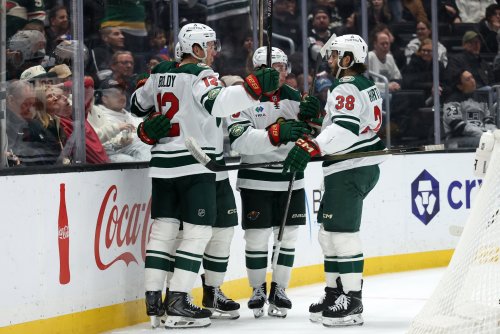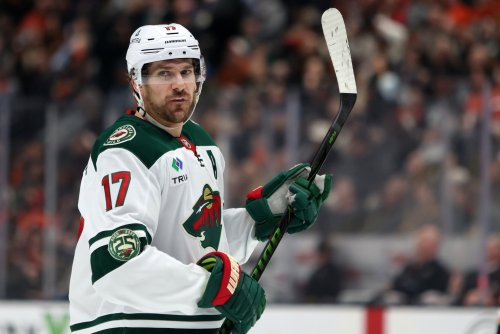
When the Minnesota Wild exited the ice inside Honda Center after their 5-4 overtime victory over the Anaheim Ducks on March 8, pretty much no one expected it to be their last hockey game for the foreseeable future. But due to the COVID-19 outbreak, we’ve been left without Wild hockey for two and a half months.
Thankfully, the long wait for the Wild to return to play is finally, potentially, almost over.
On Friday, the National Hockey League Players’ Association approved the NHL’s proposal to return to play with a 24-team playoff format. Tuesday, NHL commissioner Gary Bettman made the formal announcement of the planned 24-team tournament, adding some clarity to the format. In this 24-team tournament, the top four teams in each conference will earn a first-round bye while the remaining 16 teams will square off to face one another in a best-of-five play-in series. As the remaining teams embark on their play-in series, the top four teams in each conference will all take part in a three-game round robin to determine seeding.
Once the five-game play-in series and three-game round robins conclude, the conference quarterfinals will begin with either a five-game or seven-game series, which has yet to be decided. The conference finals and Stanley Cup Final, however, will both be seven-game series.
So, what does this all mean for the Wild? Well, it means they’re officially going to make the playoffs! With a 35-27-7 record on the year, the Wild are one of several teams that, under ordinary circumstances, would have missed out on the postseason. But given the current state of affairs, those “bubble” teams are getting a fair shot at qualifying for the postseason.
In the first round of the 24-team tournament, the Wild will take on the Vancouver Canucks in a five-game play-in series. The winner of that series will then earn a date with one of the top four teams in the Western Conference — the St. Louis Blues, Colorado Avalanche, Vegas Golden Knights and Dallas Stars — in either a best-of-seven or best-of-five series in the second round.
Minnesota faced off against Vancouver three times this season, losing their first matchup by a score of 4-1 in Xcel Energy Center. The Wild beat Vancouver in their following two meetings, though — the first a 4-2 win in St. Paul, and the second a 4-3 shootout victory at Rogers Arena.
In the event that the Wild lose the five-game series against the Canucks, Minnesota will then be eligible for a spot in the draft lottery and have a small chance of getting the first overall pick in the 2020 NHL Entry Draft — whenever that will be. The draft lottery may take place in phases. The first phase will be held on June 26, which will obviously take place before the start of the 24-team tournament. Depending on the results of the first drawing, a second drawing may be necessary.
In essence, if the teams that are drawn are not taking part in a play-in series, a second phase will not be needed. However, if a team like the Pittsburgh Penguins is drawn, a second phase will take place.
Speaking of which, how does this impact Minnesota’s first-round pick that they acquired from the Penguins in the Jason Zucker trade? Well, if Pittsburgh does not win the lottery, the pick still belongs to Minnesota. The pick is lottery protected, however, so if the Penguins do win the lottery, they will keep the first-round pick and Minnesota will then receive their 2021 first-round pick.
So, when will the festivities begin? The NHL is now in the process of beginning Phase 2 of its resumption of team activities, meaning players will be able to return to team facilities and begin practicing in small groups in early June. Phase 3, which marks the start of training camps, will begin no earlier than July 1. Phase 4, the commencement of the 24-team tournament, will follow, though there is no definitive start date for this phase.
While this is all very exciting news, there are still a lot of hoops to jump through in order to continue the NHL season. For one, the NHL still needs to determine which two cities will be the “hubs” for the postseason. The hub cities currently in consideration are Chicago, Columbus, Dallas, Edmonton, Los Angeles, Pittsburgh, Toronto, Vancouver, Las Vegas and, of course, Minneapolis/St. Paul. Once that is determined, the NHL will then need to guarantee its players and staff a safe, COVID-19-free tournament. The health of the staff and players is paramount, and if that cannot be achieved, the continuation of the season may not be possible.
At any rate, it’s good to at least be talking about hockey again. Hopefully we’ll be actually watching hockey in the not-too-distant future.
Think you could write a story like this? Hockey Wilderness wants you to develop your voice, find an audience, and we'll pay you to do it. Just fill out this form.







Recommended Comments
There are no comments to display.
Join the conversation
You can post now and register later. If you have an account, sign in now to post with your account.
Note: Your post will require moderator approval before it will be visible.